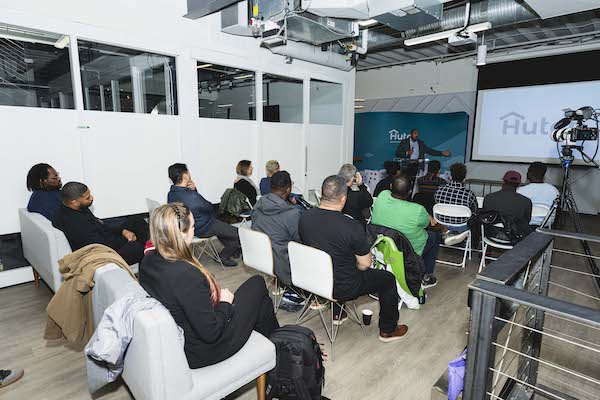After two years of sharpening their business skills, four founders of civic tech-related companies last week commemorated their successful completion of the Hutch program with a special graduation ceremony.
Founded by SaaS company Fearless and similarly based in Baltimore’s downtown/Inner Harbor area, Hutch is an intensive program dedicated to supporting minority-owned tech businesses in the lucrative government contract market — one in which Fearless has notably excelled. Small businesses and underrepresented peoples don’t always have access to the proper resources that could enable their success, which is daunting enough without a strong foundation to help them structure it. Hutch aims to provide that base by helping participants learn to navigate what federal government resources they can take advantage of, as well as master business basics.
In reflection of the mini-ecosystem that Fearless and Hutch’s leaders developed over the years, Fearless partners, Hutch alums and other stakeholders all gathered at the Spark coworking space to celebrate the four latest founders to enter their network.
To engineer the tech field inclusively, Hutch Program Manager Stephanie Chin believes programs and businesses should be built by people who represent the communities that will most benefit from their technology.
“For marginalized and underutilized groups, representation is incredibly powerful — especially when we’re building technology, solutions and services that our communities are using,” said Chin. “The community that we’re building is one of the biggest pieces of value from the program.”
Joining that community now are four CEOs, including three who spoke to Technical.ly.
Sowing the seeds of hard work into business
Vasu Togari started the Hutch program already boasting some experience dealing with federal government resources and other technical aspects. That said, he hadn’t spent much time marketing VITG, the company he founded to provide public and private clients with end-to-end digital services.
“I’ve gained a 360-degree view of the field with Hutch,” Togari said. “This program showed the value of building a brand. It’s geared towards digital services in the federal government, but there are other fundamental things you have to do as well.”
Jessica Watson, the CEO of branding and web development firm Points North Studio, used Hutch to help unlock the value she saw in transitioning to do government work.

Hutch’s graduation event. (Courtesy photo by Robert Banez)
“This program has definitely been a marathon and not a sprint,” Watson said. “I’m enthusiastic about seeing the fruits of the labor that we’ve put in and what it’s going to do in the years to come.”
CEO Joey Price of Jumpstart HR, which provides human resources consulting and capacity for other small businesses, plans to keep growing his company while offering its services both locally and nationwide. He wants to continue impacting charitable efforts in the city and partnering with players in the local tech community, too.
“Graduating feels great. My business is already growing and a lot of that is tied to the things that we did in class,” said Price.
Price, Watson and Togari all graduated alongside CEO Kalada Opuiyo Jr. of Ibeify, which offers cloud computing, automation and related services to clients.
Hutch plans for the future as the digital services community expands
Felix Gilbert, the president of XCell, was part of Hutch’s first graduating class of Hutch in 2020 and still frequently connects with other alums’ companies. Most recently, XCell partnered with a 2021 graduate and their company Theta on a project. Gilbert added that he’s actively pursuing other opportunities with Hutch companies as well.
“Joining Hutch transforms everything because they give you the tools and expose you,” said Gilbert.
Founders like Gilbert get to plug into what Chin described as a growing digital services-focused movement across government.
“What that means for our program is more support and also more needs for serving more entrepreneurs,” Chin said.
With 2023 on the way, Chin and other Hutch leaders are looking forward to expanding and rounding out the program more. Hutch recently obtained a grant from the U.S. Economic Development Administration, which Chin plans to put toward building extra support services that can help get interested individuals ready to join the incubator. The leadership also wants to extend opportunities to people who are further along with their business but don’t need as intense of a mentorship program.
At seven companies, the upcoming cohort that is graduating in 2023 is Hutch’s largest to date. An announcement puts the number of companies in Hutch’s portfolio at 20 — almost halfway toward a goal of growing 45 firms by 2025.
Before you go...
To keep our site paywall-free, we’re launching a campaign to raise $25,000 by the end of the year. We believe information about entrepreneurs and tech should be accessible to everyone and your support helps make that happen, because journalism costs money.
Can we count on you? Your contribution to the Technical.ly Journalism Fund is tax-deductible.
Join our growing Slack community
Join 5,000 tech professionals and entrepreneurs in our community Slack today!

The person charged in the UnitedHealthcare CEO shooting had a ton of tech connections

The looming TikTok ban doesn’t strike financial fear into the hearts of creators — it’s community they’re worried about

Where are the country’s most vibrant tech and startup communities?


